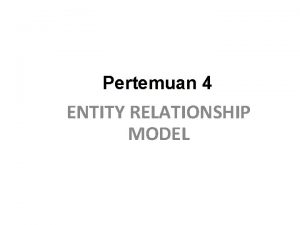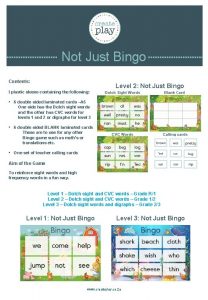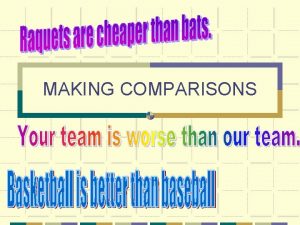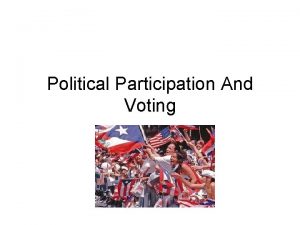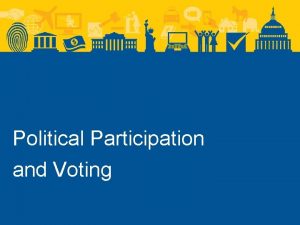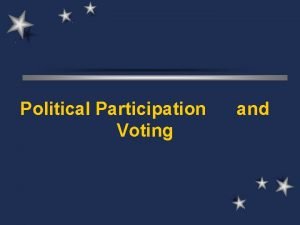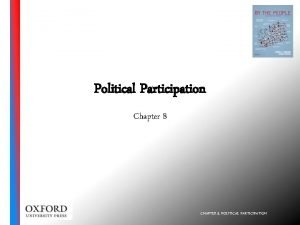The right to political participation more than just









- Slides: 9

The right to political participation: more than just the right to vote Ieva Leimane-Veldmeijere, Director of “ZELDA” – Resource Centre for People with Mental Disability (Latvia)

Right to participate in public and political life entails: the right to vote; the right to be elected; the right to participate in associations, NGOs, political parties;

Legal capacity restrictions as an obstacle to enjoy the right to political participation In many countries guardianship means: - automatic deprivation of the right to vote and to be elected; - prohibition of the right to become a member of an association; NGO or political party. /e. g. example on debate on legal incapacity and membership in NGOs – crucial for movement of selfadvocacy/

Developments at international/local level ØClear messages from various international bodies (e. g. UN; Venice Commission; Council of Europe; the European Court of Human Rights) supporting the principle: Everybody should have the right to vote ØDevelopments at the national level (e. g. Latvia’s example – regards not restricting personal, non-material rights, including the right to vote)

How to support the right to vote? 1) Making information accessible (info on electoral process; info guides on political parties and their programs in easy-to-read language); 2) Visual aids/ info materials demonstrating the voting process; 3) Training for electoral officials; 4) Training for people with intellectual disabilities; 5) Assisted voting.

Assisted voting: role of assistant during voting process (US example – from Guidelines of Bazelon Center for Mental Health Law & National Disability Rights network) ü ü Voters can choose a person who will assist in voting process. (few exceptions, e. g. Voter’s employee should not be assistant). Assistant: - could ask the voter what choice person wants to make, but he/she should not make assumptions about how person wants to vote; - should respect voter’s privacy during voting process; - should respect voter’s opinion; - should be prepared to explain/demonstrate voting process; - could read or explain all ballot choices or questions in a language the voter understands; - after ballot has been completed, (assistant) should make sure if voter’s choices are accurately reflected;

Assistant SHOULD NOT: - Make decisions for the voter; - Communicating with the voter in a way what makes voter to be forced to make certain choices; - Pressing the voter to vote for a particular candidate or in certain way; - Withholding information or giving false information to voter; - Revealing to others how person voted

!!! Challenge How to find the balance between providing the support and influencing voter’s decisions? /e. g. negative example – director of institution = candidate for elections = support provider/

Ieva Leimane-Veldmeijere – ieva@zelda. org. lv RC “ZELDA” address: Mārupes street 4 -31, Riga, LV – 1002, Latvia Phone: +37167442828; http: //www. zelda. org. lv; zelda@zelda. org. lv
 More more more i want more more more more we praise you
More more more i want more more more more we praise you More more more i want more more more more we praise you
More more more i want more more more more we praise you Right product right place right time right price
Right product right place right time right price Right time right place right quantity right quality
Right time right place right quantity right quality Contoh participation constraint
Contoh participation constraint Software is more than just
Software is more than just Notjustbingo
Notjustbingo Math is more than just numbers
Math is more than just numbers It's more than just rain or snow
It's more than just rain or snow It's more than just oil slogan
It's more than just oil slogan




